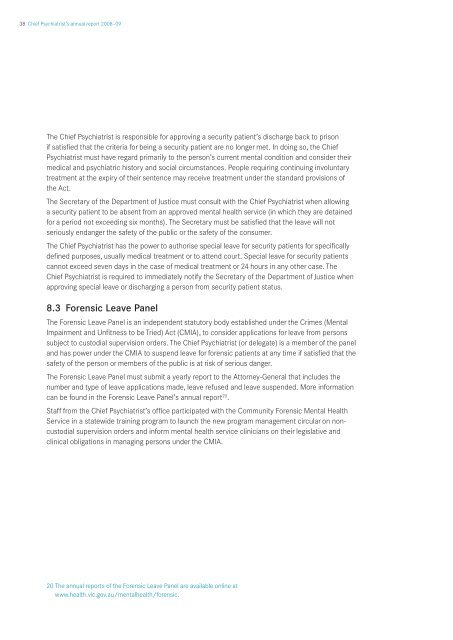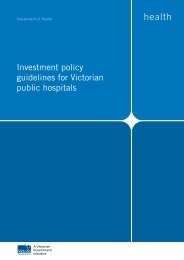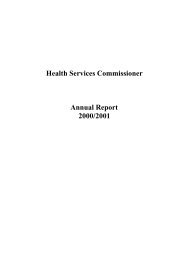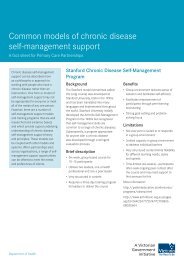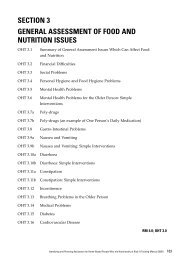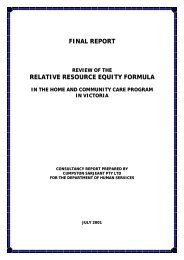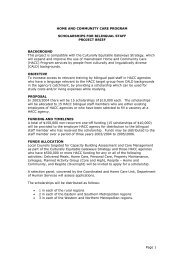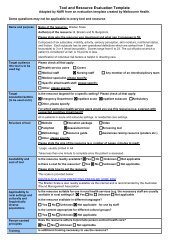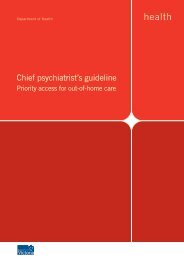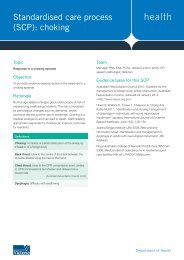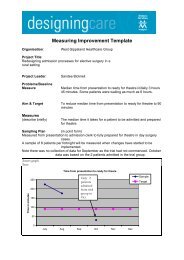Chief Psychiatrist's annual report 2008-09 - Department of Health
Chief Psychiatrist's annual report 2008-09 - Department of Health
Chief Psychiatrist's annual report 2008-09 - Department of Health
You also want an ePaper? Increase the reach of your titles
YUMPU automatically turns print PDFs into web optimized ePapers that Google loves.
38 <strong>Chief</strong> Psychiatrist’s <strong>annual</strong> <strong>report</strong> <strong>2008</strong>–<strong>09</strong><br />
The <strong>Chief</strong> Psychiatrist is responsible for approving a security patient’s discharge back to prison<br />
if satisfied that the criteria for being a security patient are no longer met. In doing so, the <strong>Chief</strong><br />
Psychiatrist must have regard primarily to the person’s current mental condition and consider their<br />
medical and psychiatric history and social circumstances. People requiring continuing involuntary<br />
treatment at the expiry <strong>of</strong> their sentence may receive treatment under the standard provisions <strong>of</strong><br />
the Act.<br />
The Secretary <strong>of</strong> the <strong>Department</strong> <strong>of</strong> Justice must consult with the <strong>Chief</strong> Psychiatrist when allowing<br />
a security patient to be absent from an approved mental health service (in which they are detained<br />
for a period not exceeding six months). The Secretary must be satisfied that the leave will not<br />
seriously endanger the safety <strong>of</strong> the public or the safety <strong>of</strong> the consumer.<br />
The <strong>Chief</strong> Psychiatrist has the power to authorise special leave for security patients for specifically<br />
defined purposes, usually medical treatment or to attend court. Special leave for security patients<br />
cannot exceed seven days in the case <strong>of</strong> medical treatment or 24 hours in any other case. The<br />
<strong>Chief</strong> Psychiatrist is required to immediately notify the Secretary <strong>of</strong> the <strong>Department</strong> <strong>of</strong> Justice when<br />
approving special leave or discharging a person from security patient status.<br />
8.3 Forensic Leave Panel<br />
The Forensic Leave Panel is an independent statutory body established under the Crimes (Mental<br />
Impairment and Unfitness to be Tried) Act (CMIA), to consider applications for leave from persons<br />
subject to custodial supervision orders. The <strong>Chief</strong> Psychiatrist (or delegate) is a member <strong>of</strong> the panel<br />
and has power under the CMIA to suspend leave for forensic patients at any time if satisfied that the<br />
safety <strong>of</strong> the person or members <strong>of</strong> the public is at risk <strong>of</strong> serious danger.<br />
The Forensic Leave Panel must submit a yearly <strong>report</strong> to the Attorney-General that includes the<br />
number and type <strong>of</strong> leave applications made, leave refused and leave suspended. More information<br />
can be found in the Forensic Leave Panel’s <strong>annual</strong> <strong>report</strong> 20 .<br />
Staff from the <strong>Chief</strong> Psychiatrist’s <strong>of</strong>fice participated with the Community Forensic Mental <strong>Health</strong><br />
Service in a statewide training program to launch the new program management circular on noncustodial<br />
supervision orders and inform mental health service clinicians on their legislative and<br />
clinical obligations in managing persons under the CMIA.<br />
20 The <strong>annual</strong> <strong>report</strong>s <strong>of</strong> the Forensic Leave Panel are available online at<br />
www.health.vic.gov.au/mentalhealth/forensic.


